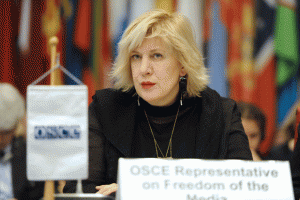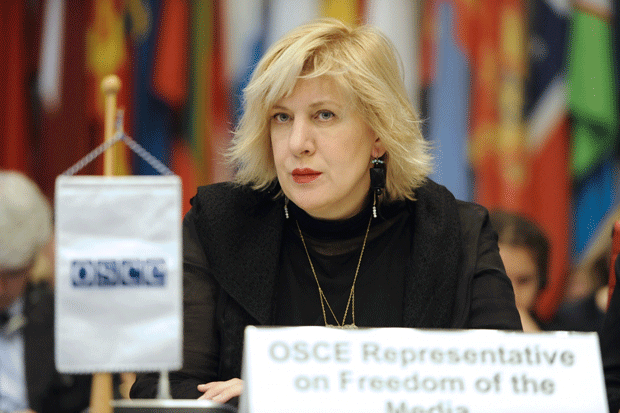
Dunja Mijatovic is the OSCE Representative on Freedom of the Media. (Photo: OSCE/Micky Kroell)
Each autumn, more than 1,000 government and civil society representatives from 57 countries of the OSCE get together in Warsaw for a two-week discussion on a wide variety of human rights issues. The purpose of the meeting is to scrutinize each country’s performance on human rights standards they signed up to in areas such as free expression, free media and the panoply of basic rights prevalent in modern, liberal societies. It is designed to be a thoughtful and lively event that gets to the heart of implementing states’ commitments on the issues.
This year the first topic was dedicated to freedom of expression and the keynote speaker, Danish human rights lawyer Jacob Mchangama, raised “the issue du jour”: “Does a genuine commitment to tolerance, equality and nondiscrimination really depend on restricting the very freedom that has made possible the articulation and spread of new and progressive ideas from religious toleration in 17th century Europe, the abolishment of slavery, the equality of the sexes, criticism of apartheid and the rights of LGBT people?”
The issue, of course, is whether we need the spate of new laws enacted worldwide designed to somehow strike a balance between the right of free expression and the desire to weed out intolerance and hate in society.
In the wake of the Charlie Hebdo massacre in January, the answer to Mchangama’s question may well form the superstructure of the rights to free speech in the years to come.
We don’t need new laws. Indeed, it is time we stop looking at unbridled speech as something that promotes intolerance. We should see it as an opportunity to protect the rights of minorities and marginalised people to speak when the powerful are making distressing noises.
My reasoning is based on the simple view that when it comes to media freedom, those who govern least, govern best.
Even the best-intentioned laws cannot prevent intolerant speech. And general notions such as “hate speech” preferably should be avoided because they can be arbitrarily interpreted.
It is a decidedly New Age thought, likely first made popular by the 19th century essayist Henry David Thoreau in his essay on Civil Disobedience.
But today it is commonly thought that laws criminalising hate speech are beneficial to marginalized groups that need state protection. In reality, it is the marginalized groups who need the freedom of speak without fear of prosecution to press their causes and affirm their rights in society.
As Mchangama said in his address: “The freedoms that (sometimes) allow bigots to bait minorities are also the very freedoms that allow Muslims and Jews to practice their faiths freely. By further eroding these freedoms, no one is more than a political majority away from being the target rather than the beneficiary of laws against hatred and offence.”
Indeed, a significant development post-Charlie Hebdo has been the distressing comments by some that openly suggested the magazine’s staff “had it coming to them” for publishing illustrations satirising the prophet Muhammad. Just think of it: the victims of an outrageous act of silencing speech actually became, in some people’s eyes, the guilty ones.
It is time for some civility in the chaotic world of free speech. As I wrote shortly after the attack: “Intolerant speech should be primarily fought with more speech.” I still believe that is the foundation of any attempts to regulate content.
Following that line, I suggested, among other things, that participating states (the member countries of the Organization for Security and Co-operation in Europe):
· Refrain from banning any form of public discussion or critical speech, no matter what it refers to;
· Take all possible measures to fight all forms of pressure, harassment or violence aimed at preventing opinions and ideas from being expressed or disseminated; and
· Eliminate restrictions to freedom of expression on the exclusive grounds of hatred, intolerance or potential offensiveness. Legislation should only focus on speech with can be directly connected to violent actions, harassment or other forms of unacceptable behavior against communities or certain parts of society.
My full statement on this issue.





